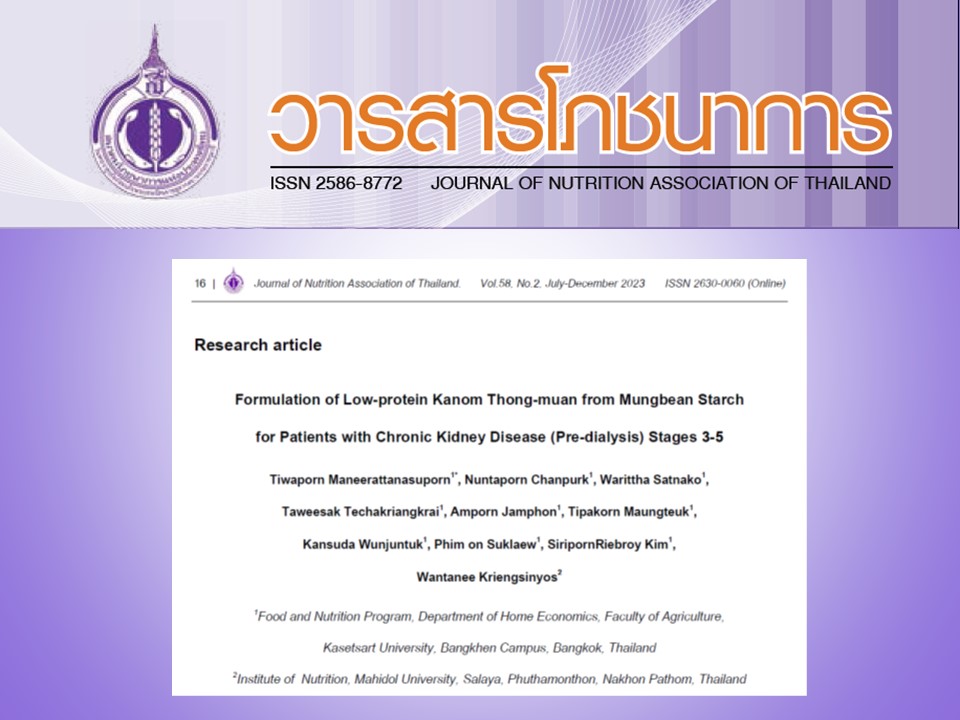Formulation of Low-protein Kanom Thong-muan from Mungbean Starch for Patients with Chronic Kidney Disease (Pre-dialysis) Stages 3-5
Keywords:
Chronic kidney diseases, Low protein dessert, Mungbean starch, Thong-MuanAbstract
This study aimed to develop a low-protein dessert, Khanom Thong-muan, for chronic kidney diseases (pre-dialysis) stages 3-5 (CKD), using mungbean starch. A low-protein diet is recommended for patients with CKD in order to reduce kidney workload. Formulating a low-protein diet increases food choices for CKD patients. Khanom Thong-Muan is a common dessert served, it contains protein from egg and flour. The starch and flour in control (C) were substituted with mungbean starch and coconut milk at the ratios of 1:1.5 (C-1), 1:1.75 (C-2), and 1:2 (C-3), without adding eggs and sesame seeds. There was no statistically significant difference in the likeness scores among the recipes (C-1, C-2, and C-3) (p > 0.05), but C-1 showed higher scores in every sensory characteristic. The protein content of C-1 was 98.8% reduction compared with the control (C). Additionally, lower fat and no cholesterol contents were obtained by omitting the egg and sesame. Furthermore, mineral content in C-1, particularly sodium, and phosphorus, this recipe contained no eggs and sesame seeds. The acceptability of the C-1 recipe ranged from moderately to like very much (scores 7.97-8.27). Ninety-four percent of consumers were willing to buy C-1. In conclusion, low-protein Khanom Thong-Muan using mungbean starch with coconut milk at a ratio of 1:1.5 (w:w) was well accepted and could be served as an alternative dessert for patients with chronic kidney disease (pre-dialysis) stages 3-5.
References
Hyun YY, Lee KB, Han SH, et al. Nutritional Status in Adults with Predialysis Chronic Kidney Disease: KNOW-CKD Study. J Korean Med Sci. 2017;32(2):257-263.
Pawlaczyk W, Rogowski L, Kowalska J, et al. Assessment of the Nutritional Status and Quality of Life in Chronic Kidney Disease and Kidney Transplant Patients: A Comparative Analysis. Nutrients. 2022;14(22):4814.
มาตรฐานผลิตภัณฑ์ชุมชน 1577/2564. ขนมทองม้วน. สำนักงานมาตรฐานผลิตภัณฑ์อุตสาหกรรม กระทรวงอุตสาหกรรม 2564: 6 หน้า
วิไลรัตน์ มั่นคง, จิราภรณ์ โตแหยม, จิราพัทธ์ แก้วศรีทอง, ผกาวดี เอี่ยมกำแพง, อารี ธนวัฒน์ชัย. การพัฒนาผลิตภัณฑ์ขนมทองม้วนเสริมผงตะไคร้. การประชุมวิชาการระดับชาติ สถาบันวิจัยและพัฒนา มหาวิทยาลัยราชภัฏกำแพงเพชร ครั้งที่ 2; 22 ธันวาคม 2558; กำแพงเพชร: มหาวิทยาลัยราชภัฏกำแพงเพชร;2558. 595-602
สุนันท์ บุตรศาสตร์, สาริณี เสริมไธสง, รุ่งทิพย์ เจริญมูล. การพัฒนาผลิตภัณฑ์ทองม้วนข้าวกล้องมันปูผสมแก่นตะวันเสริมสารสีจากพืช.รายงานผลการวิจัย. มหาสารคาม: มหาวิทยาลัยราชภัฏมหาสารคาม.2561
ศุภเวช ทิพย์ธารา. การพัฒนาผลิตภัณฑ์ขนมทองม้วนเสริมฟักข้าว. (วิทยานิพนธ์ปริญญา มหาบัณฑิต). กรุงเทพฯ: มหาวิทยาลัยเทคโนโลยีราชมงคลพระนคร.2560
รัชนีพร โพธินาม, อนุชิตา มุ่งงาม, ทัตดาว ภาษีผล. องค์ประกอบทางเคมีและคุณสมบัติทางกายภาพของสตาร์ชถั่วเขียวและถั่วพุ่มและการประยุกต์ใช้ในการผลิตวุ้นเส้น. วารสารแก่นเกษตร. 2559;44(ฉบับพิเศษ1):1073-1079
รัมภา ศิริวงศ์. ขนมไทย เล่ม 1.กรุงเทพ: สำนักพิมพ์ดวงกมลพับลิชชิ่ง;2552.
สุปราณี แพรศิริ.ขนมไทย.กรุงเทพ:เอ็มไอเอส;2552.
ทัศนีย์ โรจนไพบูลย์.ตำรับขนมไทย.กรุงเทพ:บริษัท เจเนอรัลบุ๊คส์ เซนเตอร์ จำกัด;2532.
Kim YY, Woo KS, Chung HJ. Starch characteristics of cowpea and mungbean cultivars grown in Korea. Food Chem. 2018;263:104-111.
Fang C, Huang J, Pu H, Yang Q, Chen Z, Zhu Z. Cold-water solubility, oil-adsorption and enzymolysis properties of amorphous granular starches. Food Hydrocolloids [Internet]. 2021 Aug;117:106669.
Tester, R. F., & Morrison, W. R. Swelling and gelatinization of cereal starches. I. Effects of amylopectin, amylose, and lipids. Cereal Chemistry. 1990;67:551–557.
Chen Y, Chen Y, Fang Y, Pei Z, Zhang W. Coconut milk treated by atmospheric cold plasma: Effect on quality and stability. Food Chem. 2023;430:137045.
Ikizler TA, Burrowes JD, Byham-Gray LD, Campbell KL, Carrero J-J, Chan W, et al. KDOQI Clinical Practice Guideline for Nutrition in CKD: 2020 Update. American Journal of Kidney Diseases [Internet]. 2020 Sep;76(3):S1–107.
Liu T, Wu Y, Qin Y, Zhang Y. Characteristics of Protein from Mung Bean Starch Processing Wastewater. Food Science. 2017;38:104-110.

Downloads
Published
How to Cite
Issue
Section
License
Upon acceptance of an article, copyright is belonging to the Nutrition Association of Thailand.


